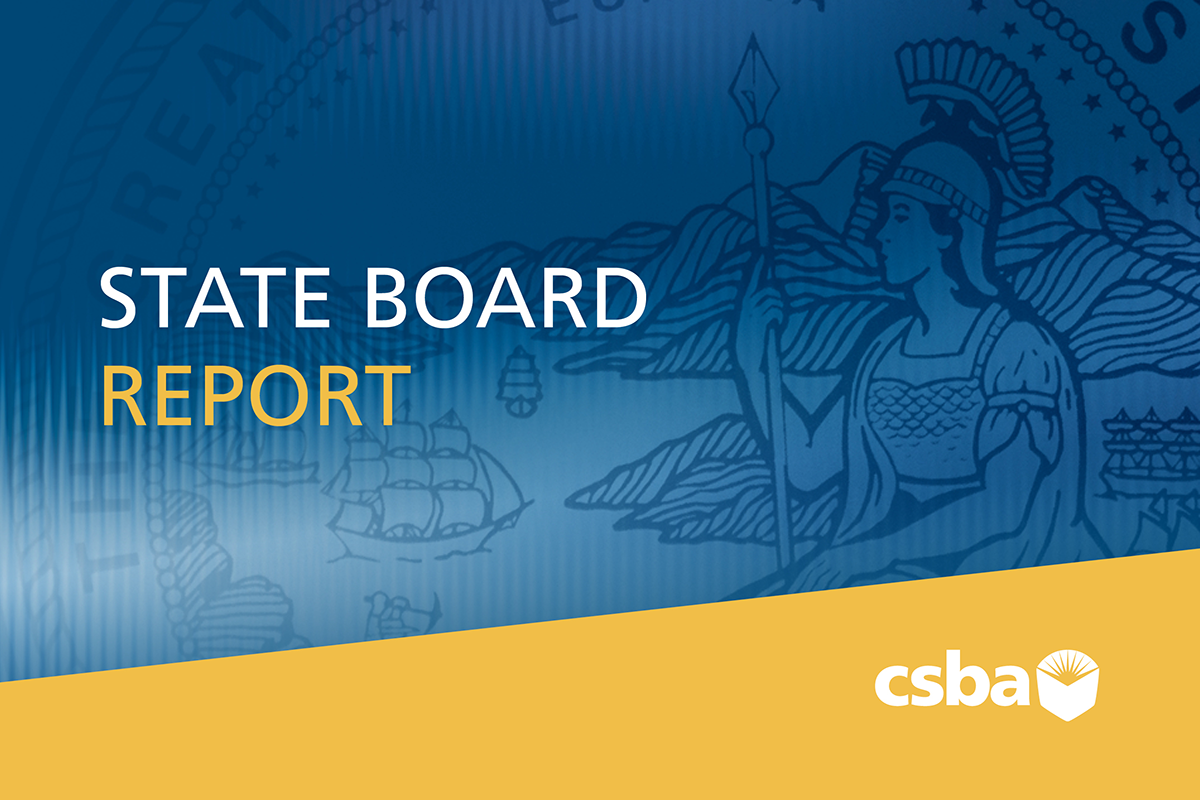The State Board of Education met virtually March 16–18 to discuss a number of big-ticket items that drew passionate debate from the public regarding the final adoption of the Ethnic Studies Model Curriculum, waivers from federal assessment requirements and more. Board President Linda Darling-Hammond noted the meeting took place nearly one year after the board last met in person but expressed hope that the state was beginning to turn a corner with the rapid administration of the COVID-19 vaccines and the momentum building across the state in reopening schools.
“We have learned a lot in the last year — public schools have been heroic in getting meals and technology to students and families, learning how to teach digitally, and finding ways to wraparound the states most vulnerable students,” she said on the first day of a rare three-day SBE meeting. “We’re hopeful that this can launch us on a path to reimagining schools so that they focus on the needs of the child … In our deliberations over the course of this meeting, we can support this work with support for useful informative assessments, additional funding and guidance for literacy development, and support for a culturally responsive and sustaining curriculum.”
Ethnic Studies Model Curriculum gets final approval
Just two days after six Asian Americans were murdered — targeted because of their ethnicity and gender in a year in which hate crimes against people of Asian ancestry rose by nearly 150 percent — the State Board moved March 18 to adopt the Ethnic Studies Model Curriculum for high school students in California.
“This is our opportunity to confront racism here as a state as we take up the Ethnic Studies Model Curriculum. We’re reminded daily that racial injustice is not only a legacy of the past, but a clear and present danger,” Darling-Hammond said, naming just some of the victims of race-based violence in recent years, including those in Atlanta whose identities have been made public. “This latest moment is built on a past that includes Chinese exclusion and Japanese internment … we must understand this history if we’re to finally end it and usher in a new day in California and in the country.”
It has been a more than four-year-long process to bring the model curriculum forward. One that garnered significant public scrutiny. CDE staff fielded more than 100,000 comments across three field reviews of the curriculum, which resulted in more than 200 edits to the draft model curriculum, including the addition of more than two dozen submitted sample lessons. Following those revisions, the original writers of the curriculum demanded in February that their names be removed from the document, writing in a letter to the State Board that the revisions made to the model curriculum no longer reflected the original mission of ethnic studies.
While it focuses on the four foundational disciplines of ethnic studies as created at San Francisco State University in 1969 — African American Studies, Asian American Studies, Latino Studies and Native American Studies — education officials have emphasized that the model curriculum is just that, a model that schools can choose to adopt and should be adjusted to local demographics and experiences of the community.
The model curriculum is not a full curriculum, but rather, guidelines on the goals and principles of ethnic studies, suggested lesson plans and instructional approaches, a list of ethnic studies courses already meeting UC and CSU course credit requirements, and soon, a bibliography.
Gov. Gavin Newsom vetoed a bill in October that would have made ethnic studies a requirement for high school graduation but has proposed $5 million in the 2021–22 state budget for professional development to teach the subject. The author of last year’s bill has reintroduced similar legislation again this legislative session.
Approval of federal waivers regarding assessment accountability
When schools across the country closed for in-person instruction last March due to the pandemic, the U.S. Department of Education quickly granted blanket waivers from administering required standardized tests in math, English language arts and science to all states. On Feb. 22, the Biden administration announced that states must resume testing this year, but that officials could apply for waivers from some testing requirements and to allow more flexible testing options, such as extending the time allowed to administer the tests into summer or even fall, shortening the exams and administering them remotely.
California is submitting several waivers to the Education Department. One would relieve any consequences for the state if less than 95 percent of students are tested, a federal requirement tied to funding. Another would extend the timeframe an extra two weeks for administering all tests until July 30, 2021; and a third seeks relief for the administration of the California Science Tests for the 2020–21 school year.
The board will also pursue a waiver allowing local educational agencies to use the most viable option for assessments in their local context for the 2020–21 school year. These could include the Smarter Balanced Summative Assessments or other various diagnostic, benchmark or interim assessments that are aligned with the Common Core State Standards for English language arts and math; are available to assess students in grades three through eight and 11; are uniformly administered across a grade span, school or district; and provide results that can be reported to families and the public.
Rachael Maves, deputy superintendent of the CDE’s instruction and measurement branch, noted that the department has developed an approach that attempts to balance the reality of education during the pandemic, the need of educators to have sufficient data to understand current learning gaps and the desire of families to have information regarding their child’s learning. “The necessary flexibilities do not come without a cost,” she said. “What we gain in allowing LEAs to utilize their locally chosen assessments, we lose in the normal, comparable test results we get when all students take the same high-quality assessment. However, we believe it is the best option during truly imperfect times.”
Additionally, board member Patricia Rucker said she understands stakeholders’ desire to have uniform testing and data points, noting this decision does not cancel statewide testing — a sentiment expressed numerous times in public comment. “It’s intended to maximize the options and the flexibilities that LEAs have for their testing and assessment regimen that’s currently in place, and to give them the local option to choose the best pathway for them to proceed to continue to assess and develop a report,” she said.
The board also approved a Finding of Emergency, which extends both the testing and annual summative assessment windows for 2020–21 school year.
In November, the board voted to create shortened versions of the states’ standardized tests in math and English language arts that could cut down the typical testing time by about two hours depending on grade level. The state has also developed for this year a remote proctoring system embedded into the online testing software that would allow teachers to view students through web cameras, speak via video and text chat and pause testing as needed. Despite those adjustments, the logistics of testing all eligible students with the California Assessment of Student Performance and Progress and English Language Proficiency Assessments for California may still be challenging as many LEAs are focused on reopening campuses safely and planning for extended learning, CDE staff said.
In other State Board meeting news:
- The board approved Indicator 17 of the State Performance Plan and Annual Performance Report for Special Education for submission to the U.S. Department of Education Office of Special Education Program. The new indicator aims to shift attitudes toward inclusion, equity and access by promoting implementation of inclusive practices in the classrooms.
- The State Literacy Plan — which aligns and integrates state literacy initiatives, content standards and state guidance documents to support teachers of students, birth through grade 12 —received final approval. CDE staff noted that the plan is not intended to create new policies or guidance, nor will it include tools, resources or templates. Instead, all of these resources will be housed in an online literacy resources repository as they are identified and/or developed.
- Per CDE staff recommendations, the board approved the 2020–21 Consolidated Application that each LEA is required to submit annually in order for the CDE to send funding to LEAs that are eligible to receive federal categorical funds. The ConApp is the annual fiscal data collected from the LEAs as required by the federal Elementary and Secondary Education Act of 1965.
The next State Board virtual meeting is scheduled for May 12–13, 2021. View the full meeting calendar.




